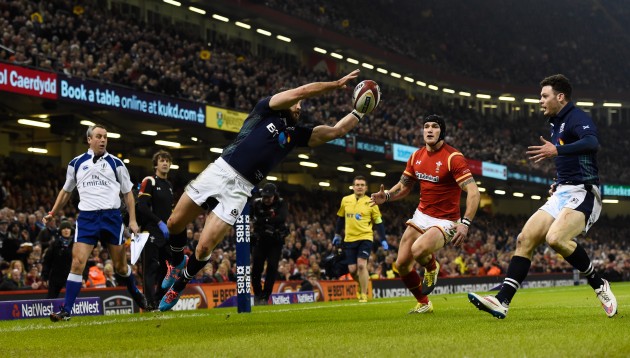That, at least, was more like it
We can debate the interpretations of Law 11 (dealing with offside) until the cows come home, but until another unlikely ruling from World Rugby confirming Scotland were hard done by, their fans have to console themselves with a vastly improved performance from the team – but yet another loss. It was about what was expected; there was no doubt that Scotland could raise their level of performance and answer their critics after last week, but beating Wales in Cardiff was always going to be a huge ask at a venue with no successes since 2002.
For about an hour it was a perfectly good test match, with both teams playing at a high tempo and intensity level. Then the Scotrot (I’m trade-marking that) set in once again, and two simple tries later Scotland were out of the hunt.
Taylor is up to the job but needs more ball
Duncan Taylor put in a solid defensive performance, including an important tackle on Tom James that prevented a certain try. However he really had one carry of note, that he turned into an individual try. I don’t think the player himself is at fault, as Matt Scott the week before was also excellent in defence but had very few chances to do the direct ball carrying both men specialise in. Our pattern of attacking play, when not quick one-out ball to ambling forwards, seems to revolve around quick ball to Finn Russell aimed at putting the fullback and wings into play quickly in the midfield and wide channels.

Needing more ball: Duncan Taylor did a fine job
We have a choice of those strong runners at 12 and the talented Mark Bennett at 13 but over the last two weeks the centres have been used largely as decoys. New attack coach Jason O’Halloran should be making more use of the talent in midfield (Bennett had a better, but quiet game again) to keep the Italian defence guessing.
Taylor should start against Italy, but give him something to do other than tackle.
When Greig gets going, Scotland look a lot more effective
With Greig Laidlaw varying his point of attack and choosing to offer a running threat himself, the space opens up for everyone else in his backline. Admittedly he still crabs sideways a bit too much which shuts it right down again, but the Welsh defence had to do a lot more scrambling than England‘s did as the Scots found space in behind. When the pace (and presumably the players) flagged in the middle of the second half suddenly everything became that much easier for the men in red to defend. Sam Hidalgo-Clyne brought a return to the increased tempo that Scotland absolutely need to play with when he came on, but by then the damage was done. That he hasn’t had more chances is a reflection either on his poor club form or on Scotland’s depth on the bench.

Tipping point: Greig Laidlaw parries the ball to team-mate Seymour
Depth is still the main issue
During the World Cup, Scotland were stuttering, but able to maintain a high level of performance right through the full 80 minutes. The reason? Better depth on the bench. Last week we saw the issues in the second half against England and again there was a poor period mid second half when the game was taken away from them. When a team is well in the game – not just hanging on, but in fact leading after an hour – the bench should be consolidating that position, rather than tired or over-eager players making unforced errors.
Unfortunately the opposite happened: while Scotland needed to up the tempo it was the Welsh that started running riot – George North’s try being the prime example.
The scrum is one of the key areas where Scotland suffer in the late periods of the game, when either the replacements came on and dropped balls (Gordon Reid) or they weren’t used (in the case of Zander Fagerson) and left WP Nel showing visible physical and mental fatigue as he played the full 80.
Changes can be made
With that in mind Scotland need a stronger bench, and Vern Cotter could drop one or two of the incumbents and look for them to make an impact as a substitute to earn their place back. With the lineout stuttering and Ross Ford missing in the loose for a second week, he would be top of the list and would in fact make a very good impact sub with Stuart McInally given a chance to start.

Looking for change: Should Vern Cotter switch-up his bench for Italy?
Tom Brown of Edinburgh is also in fine fettle as a winger and could be called up to the squad, as could one or other of the Toolis brothers who are also going well for Edinburgh. If Josh Strauss plays well this week for Glasgow he or Rob Harley could come in to back-row contention – John Barclay and John Hardie are both playing very well but are not big ball carriers and David Denton is another who has yet to set the heather alight. It is telling that Stuart Hogg was our top carrier in metres made and he went off after 25 minutes.
Although some of the problems might be as a result of players missing through injury, there are about to be options for the Scotland management too with talk from Cotter that Peter Horne, Sean Maitland, Tim Visser, Matt Scott and even Grant Gilchrist could come into consideration for the Italy game.
It’s not all doom and gloom, and if Scotland play like they did against Wales with a better bench they should beat Italy, but Cotter needs to be wary of being drawn into a dogfight between two sides desperate for a win.





